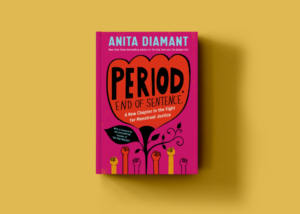
Reducing Stigma to Advance Menstrual Equity by Hope Juzon
Every menstruator is familiar with the tinge of fear when they are caught without. Many menstruators are familiar with the discomfort of spotting or bleeding through their clothes, a feeling only exacerbated by the stigma associated with menstruating in public. Many experience shame and embarrassment—as one of my close friends put it when she was caught without recently, she simply “had to leave.”
As an intern with the National Council of Jewish Women (NCJW) Minnesota Section, I have engaged in their menstrual equity efforts to make menstrual products widely accessible across Minnesota. NCJW’s recent work has been in conjunction with state legislators to advance a bill that would require and fund the distribution of menstrual products in public school bathrooms. We have begun to recognize, however, that work towards advancing this legislation must begin with education.
Through NCJW, I had the opportunity to organize a community book talk with Anita Diamant, author of Period. End of Sentence, where she explored the implications of shame and the stigma surrounding menstruation. Diamant noted throughout the book and during the event that young people, particularly young girls, appear to be embracing menstruation more than previous generations. Young people are working to advance menstrual equity, beginning with their own school communities.
While we must recognize and commend this progress, it is crucial that we continue to advance education surrounding menstruation. In partnership with my second internship site, Planned Parenthood North Central States, I am working on a menstruation curriculum to be taught in schools and community programming. Though we, as a society, are discussing menstruation more openly than before, there are still households where the dialogue surrounding menstruation begins and ends with sliding a pad into a young menstruator’s hand. Through educating our community members, we hope to dismantle the shame surrounding menstruation. We seek to give people the power to begin dialogues surrounding their needs and the needs of their fellow menstruators. Menstruators deserve to share their experiences in all spaces and have non-menstruators hear their plea for menstrual equity. As we advance our legislative efforts to make menstrual equity in schools a policy priority, we recognize that this work begins at the grassroots level with the community most affected.
